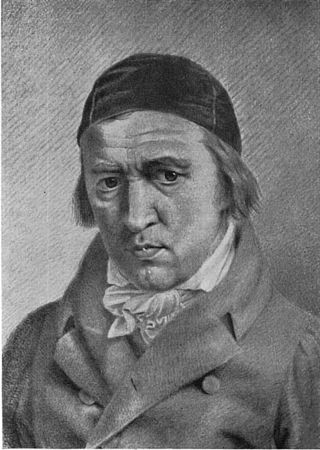Related Research Articles

Johann Christoph Friedrich von Schiller was a German playwright, poet, philosopher and historian. Schiller is considered by most Germans to be Germany's most important classical playwright.
This article contains information about the literary events and publications of 1808.
This article contains information about the literary events and publications of 1806.
This article contains information about the literary events and publications of 1805.
This article contains information about the literary events and publications of 1804.
This article contains information about the literary events and publications of 1798.

This article contains information about the literary events and publications of 1796.
This article contains information about the literary events and publications of 1784.
This article contains information about the literary events and publications of 1785.
This article contains information about the literary events and publications of 1799.
This article contains information about the literary events and publications of 1781.
This article contains information about the literary events and publications of 1783.
This article contains information about the literary events and publications of 1787.

Turandot (1762) is a commedia dell'arte play by Count Carlo Gozzi after a supposedly Persian story from the collection Les Mille et un jours (1710–1712) by François Pétis de la Croix. Gozzi's Turandot was first performed at the Teatro San Samuele, Venice, on 22 January 1762.

Weimar Classicism was a German literary and cultural movement, whose practitioners established a new humanism from the synthesis of ideas from Romanticism, Classicism, and the Age of Enlightenment. It was named after the city of Weimar, Germany, because the leading authors of Weimar Classicism lived there.
Nationality words link to articles with information on the nation's poetry or literature.

Johann Wolfgang von Goethe was a German polymath, who is widely regarded as the greatest and most influential writer in the German language. His work has had a profound and wide-ranging influence on Western literary, political, and philosophical thought from the late 18th century to the present day. A poet, playwright, novelist, scientist, statesman, theatre director, and critic, his works include plays, poetry and aesthetic criticism, as well as treatises on botany, anatomy, and color.

Johann Heinrich Meyer was a Swiss painter, engraver and art critic. He served as the second Director of the Weimar Princely Free Drawing School. A close associate of Johann Wolfgang von Goethe, he was often referred to as "Goethemeyer".

Charlotte Luise Antoinette von Schiller was the wife of German poet Friedrich Schiller.

The original Goethe and Schiller Monument is in Weimar, Germany. It incorporates Ernst Rietschel's 1857 bronze double statue of Johann Wolfgang von Goethe (1749–1832) and Friedrich Schiller (1759–1805), who are probably the two most revered figures in German literature. The monument has been described "as one of the most famous and most beloved monuments in all of Germany" and as the beginning of a "cult of the monument". Dozens of monuments to Goethe and to Schiller were built subsequently in Europe and the United States.
References
- ↑ Breitholtz, Lennart (1954). Studier i operan Gustaf Wasa: Études sur la genèse de l'opéra Gustaf Wasa. Uppsala universitets årsskrift (0372-4654), 1954:5 (in French). Uppsala: Lundequistska bokh.
- ↑ "Notable Dates in History". The Flag in the Wind. The Scots Independent. Archived from the original on 2016-01-25. Retrieved 2016-01-20.
- ↑ David G. John (8 July 1998). Images of Goethe Through Schiller's Egmont. McGill-Queen's Press - MQUP. p. 210. ISBN 978-0-7735-1681-6.
- ↑ Stuart Sillars (23 February 2006). Painting Shakespeare: The Artist as Critic, 1720-1820. Cambridge University Press. p. 254. ISBN 978-0-521-85308-8.
- ↑ University of Montreal: British Women Playwrights around 1800 Accessed 28 April 2013
- ↑ Grenby, M.O. "'A Conservative Woman Doing Radical Things': Sarah Trimmer and The Guardian of Education." Culturing the Child, 1690–1914, ed. Donelle Ruwe. Lanham, MD: Scarecrow Press, 2005. ISBN 0-8108-5182-2, "Introduction", viii.
- ↑ Radoslav Katičić; Slobodan Prosperov Novak (1989). Two Thousand Years of Writing in Croatia. SNL. p. 114. ISBN 978-86-329-0330-2.
- ↑ Nancy Eileen Copeland (2004). Staging Gender in Behn and Centlivre: Women's Comedy and the Theatre. Ashgate. p. 15. ISBN 978-0-7546-3125-5.
- ↑ Johann Wolfgang von Goethe (1966). Iphigenia in Tauris. Manchester University Press. p. 15.
- ↑ Derek Hughes (2001). Eighteenth-century Women Playwrights: Elizabeth Inchbald. Pickering & Chatto. pp. 1–2. ISBN 978-1-85196-616-5.
- ↑ James Johnstone (1786). The Disbanded Officer: Or, the Baroness of Bruchsal: a Comedy. As Performed at the Theatre Royal in the Hay-Market. T. Cadell.
- ↑ Rhodri Evans (4 December 2014). The Cosmic Microwave Background: How It Changed Our Understanding of the Universe. Springer. p. 27. ISBN 978-3-319-09928-6.
- ↑ Daniel O'Connell (1972). 1829-1832. Irish University Press for the Irish Manuscripts Commission. p. 51.
- ↑ Stephen, Leslie, ed. (1887). . Dictionary of National Biography . Vol. 12. London: Smith, Elder & Co.
- ↑ "Füssli, Johann Kaspar". Historisches Lexikon der Schweiz (in German). Retrieved 4 January 2021.
- ↑ The Gentleman's Magazine (London, England). F. Jefferies. 1836. p. 551.
- ↑ John Louis DiGaetani (2000). Carlo Gozzi: A Life in the 18th Century Venetian Theater, an Afterlife in Opera. McFarland. p. 184. ISBN 978-0-7864-0077-5.